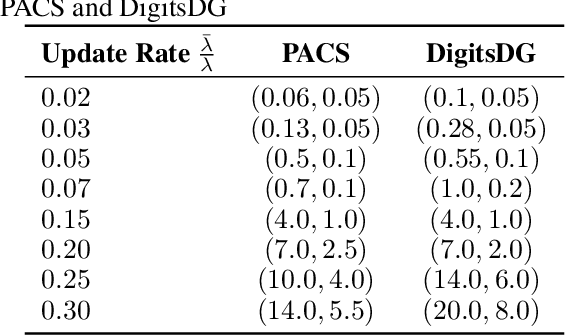Adam Piaseczny
RCCDA: Adaptive Model Updates in the Presence of Concept Drift under a Constrained Resource Budget
May 30, 2025



Abstract:Machine learning (ML) algorithms deployed in real-world environments are often faced with the challenge of adapting models to concept drift, where the task data distributions are shifting over time. The problem becomes even more difficult when model performance must be maintained under adherence to strict resource constraints. Existing solutions often depend on drift-detection methods that produce high computational overhead for resource-constrained environments, and fail to provide strict guarantees on resource usage or theoretical performance assurances. To address these shortcomings, we propose RCCDA: a dynamic model update policy that optimizes ML training dynamics while ensuring strict compliance to predefined resource constraints, utilizing only past loss information and a tunable drift threshold. In developing our policy, we analytically characterize the evolution of model loss under concept drift with arbitrary training update decisions. Integrating these results into a Lyapunov drift-plus-penalty framework produces a lightweight policy based on a measurable accumulated loss threshold that provably limits update frequency and cost. Experimental results on three domain generalization datasets demonstrate that our policy outperforms baseline methods in inference accuracy while adhering to strict resource constraints under several schedules of concept drift, making our solution uniquely suited for real-time ML deployments.
The Impact of Adversarial Node Placement in Decentralized Federated Learning Networks
Nov 14, 2023



Abstract:As Federated Learning (FL) grows in popularity, new decentralized frameworks are becoming widespread. These frameworks leverage the benefits of decentralized environments to enable fast and energy-efficient inter-device communication. However, this growing popularity also intensifies the need for robust security measures. While existing research has explored various aspects of FL security, the role of adversarial node placement in decentralized networks remains largely unexplored. This paper addresses this gap by analyzing the performance of decentralized FL for various adversarial placement strategies when adversaries can jointly coordinate their placement within a network. We establish two baseline strategies for placing adversarial node: random placement and network centrality-based placement. Building on this foundation, we propose a novel attack algorithm that prioritizes adversarial spread over adversarial centrality by maximizing the average network distance between adversaries. We show that the new attack algorithm significantly impacts key performance metrics such as testing accuracy, outperforming the baseline frameworks by between 9% and 66.5% for the considered setups. Our findings provide valuable insights into the vulnerabilities of decentralized FL systems, setting the stage for future research aimed at developing more secure and robust decentralized FL frameworks.
Mitigating Evasion Attacks in Federated Learning-Based Signal Classifiers
Jun 08, 2023Abstract:There has been recent interest in leveraging federated learning (FL) for radio signal classification tasks. In FL, model parameters are periodically communicated from participating devices, which train on local datasets, to a central server which aggregates them into a global model. While FL has privacy/security advantages due to raw data not leaving the devices, it is still susceptible to adversarial attacks. In this work, we first reveal the susceptibility of FL-based signal classifiers to model poisoning attacks, which compromise the training process despite not observing data transmissions. In this capacity, we develop an attack framework that significantly degrades the training process of the global model. Our attack framework induces a more potent model poisoning attack to the global classifier than existing baselines while also being able to compromise existing server-driven defenses. In response to this gap, we develop Underlying Server Defense of Federated Learning (USD-FL), a novel defense methodology for FL-based signal classifiers. We subsequently compare the defensive efficacy, runtimes, and false positive detection rates of USD-FL relative to existing server-driven defenses, showing that USD-FL has notable advantages over the baseline defenses in all three areas.
 Add to Chrome
Add to Chrome Add to Firefox
Add to Firefox Add to Edge
Add to Edge